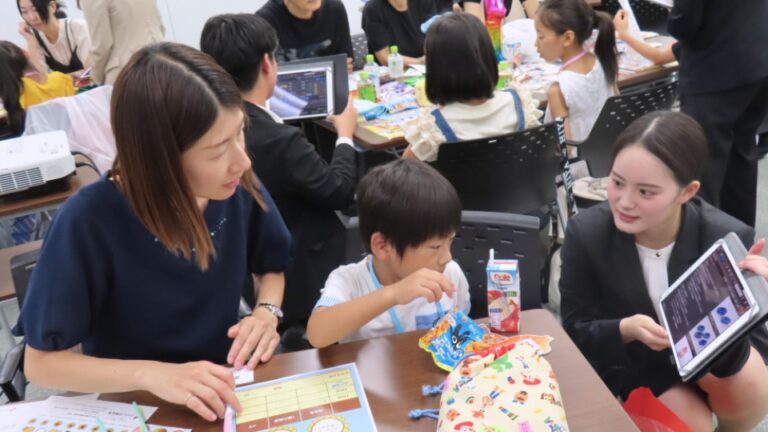Financial education for Japanese children has become more urgent since Japan lowered the age of adulthood from 20 to 18 in 2022.
One reason major securities companies are expanding their financial education programs for Japanese elementary school students is to teach them the importance of responsible money management.
The program is designed to entertain younger children by incorporating games and other activities. At the same time, efforts are underway to give teachers the training they need to teach independently without the need for financial experts.
Many of the approximately 30 children gathered at the SMBC Nikko Securities headquarters in Tokyo shouted, “I know that person.” The occasion was one of the events the brokerage held at its 89 branches across the country during the summer holidays in July and August.
Elementary school students participating in SMBC Nikko Securities’ financial and economic education seminar in Tokyo in August 2024 (Kyodo News)
We invited a total of approximately 1,500 elementary school students and their families to learn basic knowledge about money, stocks, and other securities.
A sales representative from SMBC Nikko Securities acted as a lecturer, asking the children quizzes on economic history and playing games to find out the stock prices of familiar companies.
With the launch of the Japan Personal Savings Account in 2014 (the Japanese government’s tax-free system for small investments) and the rising cost of living, more parents want their children to acquire financial literacy early on. It became like that.
A 36-year-old mother from Chiba Prefecture near Tokyo who participated in the SMBC Nikko Securities event said, “I didn’t have the opportunity to learn about money when I was a child.I want my children to be interested in money from an early age.” Ta. With my daughter who is currently in second grade.
In October, SMBC Nikko Securities established an in-house organization specializing in financial and economic education. This is part of our efforts to strengthen our approach to a wide range of generations, including working adults.
Starting in 2022, Mitsubishi UFJ Morgan Stanley Securities will begin a financial education program targeting elementary school students nationwide. The purpose is to help children understand the value of work and things through discussions about household chores and shopping, and to develop a financial sense.
In response to the growing need for financial education in schools, Daiwa Securities Group Headquarters held a training session for teachers to teach them how to teach classes using a unique game.
In July 2024, teachers participate in financial and economic education training sponsored by Daiwa Securities Group Headquarters Tokyo (Kyodo News)
This game uses toy money and cards to encourage children to think about how they can use the assets they earn from work or personal investments to fund life events such as buying a home, having a baby, or sending children to school.
A total of 35 people, including elementary, junior high and high school teachers, participated in a study session held by Daiwa in late July to learn how to play the game. An elementary school teacher in Tokyo who participated in the class said, “I want to teach my students how to become smart consumers who spend money systematically.”
In July, Daiwa Connect Securities, a major securities company, lowered the age limit for using its smartphone trading system from 15 to “junior high school students,” offering a service that even young people can use. what they have learned.
With parental consent, even junior high school students can trade stocks.
A Daiwa Connect representative said, “By actually experiencing investing, you can increase your interest in politics and economics linked to the stock market, and you can also learn about the risks of investing.”
Related coverage:
Focus: Lower age of adulthood leaves more young Japanese struggling with debt


